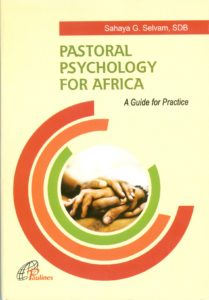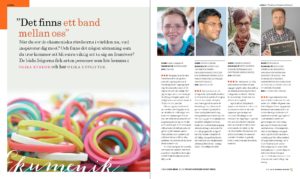 Selvam, S.G. (2019). Pastoral psychology for Africa: A guide for practice. Nairobi: Paulines Africa.
Selvam, S.G. (2019). Pastoral psychology for Africa: A guide for practice. Nairobi: Paulines Africa.
READ: AN ACADEMIC REVIEW OF THIS BOOK
In pastoral practice, good will is not good enough. We also need a scientific approach. Psychology can provide a framework for a systematic approach in pastoral care.
Psychology for Pastoral Practice in Africa is designed to offer a scientific framework for Christian ministry in traditional societies such as Africa. The approach is ecumenical and Catholic. It is scholarly and accessible.
The book has 30 chapters grouped into five parts:
1. Psychology and Pastoral Care
2. The Person of the Pastoral Practitioner
3. Along Life-Long Development
4. Anomalous and Religious Experiences
5. Groups and Individuals
Outline of a Typical Chapter
Each chapter discusses one particular problem or situation in the pastoral context, sheds light on the problem by having […]
Author: selvam
Selvam Featured on a Mission Magazine in Sweden
 According to Selvam: What is Ecumenism?
According to Selvam: What is Ecumenism?
The Spirit is alive in our dialogue among churches. Ecumenism is a concrete expression of our desire to live by the Spirit. The Pauline churches of the first century provide a viable model for unity in diversity even today. And the ecclesiology of the Fathers of the Church (c.100-451AD) provides a challenging model of diversity in unity. Our sins of in-group pride and out-group exclusion be acknowledged. Theology shouldn’t be used to justify our political sentiments. Honesty, courage, and humility of believers will make the Triune God more real in the world today.
READ THE FULL MAGAZINE: <<CLICK HERE>>
“Moulding his human personality”: Personality change and formation to priesthood in the Catholic Church
 “Moulding his human personality”: Personality change and formation to priesthood in the Catholic Church
“Moulding his human personality”: Personality change and formation to priesthood in the Catholic Church
Sahaya G. Selvam
Abstract
The official documents on formation to priesthood in the Catholic Church encourage the use of personality psychology. Generally, the documents understand human personality to be dynamic. What does this mean in the light of the contemporary debate on the psychology of personality change? This article attempts to summarize the salient features of this debate, pointing out its relevance to priestly formation. Supporting a “whole-person model” of personality as proposed by Dan McAdams, the article considers the possibility of personality change at some levels in the context of religious experience facilitated by seminary formation. This article is also aimed at enlightening formation guides to make an informed decision in the choice of appropriate models of personality in the accompaniment of their candidates.
Keywords
formation to priesthood, psychology of personality, personality […]
Academic Review of Selvam’s 2018
 Sahaya G. Selvam, PhD
Sahaya G. Selvam, PhD
Academic Contributions 2018
Publications
Selvam, S.G., & Munyiva, L. (2018). Benefits of Good Shepherd Catechesis among children with intellectual disabilities in Kenya. Journal of Religious Education, 66(3), 225-234. DOI: 10.1007/s40839-018-0069-5.
https://link.springer.com/article/10.1007/s40839-018-0069-5
Since Martin Luther, religious education has largely been identified with catechism that used question and answer method, particularly in the Catholic church. For a person with intellectual disability, this offers a grave difficulty in religious formation. Could there be alternatives? The present study aimed at exploring the benefits of Catechesis of the Good Shepherd (CGS) for children living with intellectual disabilities. The participants were 23 children and 9 care-givers in a Catholic context in Kenya. Observation guides and interviews were used to collect data that showed that children with intellectual disabilities had the ability to spontaneously relate with the spiritual world, […]
Benefits of Good Shepherd Catechesis
{{unknown}} Benefits of Good Shepherd Catechesis among Children with Intellectual Disabilities in Kenya
Benefits of Good Shepherd Catechesis among Children with Intellectual Disabilities in Kenya
by
Sahaya G. Selvam
Lucia Munyiva
Abstract
Since Martin Luther, religious education has largely been identified with catechism that used question and answer method, particularly in the Catholic church. For a person with intellectual disability, this offers a grave difficulty in religious formation. Could there be alternatives? The present study aimed at exploring the benefits of Catechesis of the Good Shepherd (CGS) for children living with intellectual disabilities. The participants were 23 children and 9 care-givers in a Catholic context in Kenya. Observation guides and interviews were used to collect data that showed that children with intellectual disabilities had the ability to spontaneously relate with the spiritual world, and in some cases, with Jesus. The findings confirmed that the CGS offers children with special needs the space, tools, and time to get in touch […]